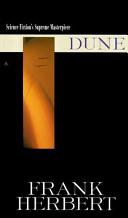Quotes from book
Dune

Dune is a 1965 science fiction novel by American author Frank Herbert, originally published as two separate serials in Analog magazine. It tied with Roger Zelazny's This Immortal for the Hugo Award in 1966, and it won the inaugural Nebula Award for Best Novel. It is the first installment of the Dune saga, and in 2003 was cited as the world's best-selling science fiction novel.Set in the distant future amidst a feudal interstellar society in which various noble houses control planetary fiefs, Dune tells the story of young Paul Atreides, whose family accepts the stewardship of the planet Arrakis. While the planet is an inhospitable and sparsely populated desert wasteland, it is the only source of melange, or "the spice", a drug that extends life and enhances mental abilities. As melange can only be produced on Arrakis, control of the planet is a coveted and dangerous undertaking. The story explores the multi-layered interactions of politics, religion, ecology, technology, and human emotion, as the factions of the empire confront each other in a struggle for the control of Arrakis and its spice.Herbert wrote five sequels: Dune Messiah, Children of Dune, God Emperor of Dune, Heretics of Dune, and Chapterhouse: Dune. The first novel also inspired a 1984 film adaptation by David Lynch, the 2000 Sci-Fi Channel miniseries Frank Herbert's Dune and its 2003 sequel Frank Herbert's Children of Dune , a series of computer games, a board game, songs, and a series of followups, including prequels and sequels, that were co-written by Kevin J. Anderson and the author's son, Brian Herbert, starting in 1999. A new film adaptation directed by Denis Villeneuve is scheduled to be released on December 18, 2020.

Princess Irulan in The Humanity of Muad'Dib
Dune (1965)
Context: Muad'Dib learned rapidly because his first training was in how to learn. And the first lesson of all was the basic trust that he could learn. It's shocking to find how many people do not believe they can learn, and how many more believe learning to be difficult. Muad'Dib knew that every experience carries its lesson.

"They Stopped the Moving Sands" part of a letter to his agent Lurton Blassingame, outlining an article on how the USDA was using poverty grasses to protect Florence, Oregon from harmful sand dunes (11 July 1957); the article was never published, but did develop several of the ideas that led to "Dune"; as quoted in The Road to Dune (2005), p. 266
General sources